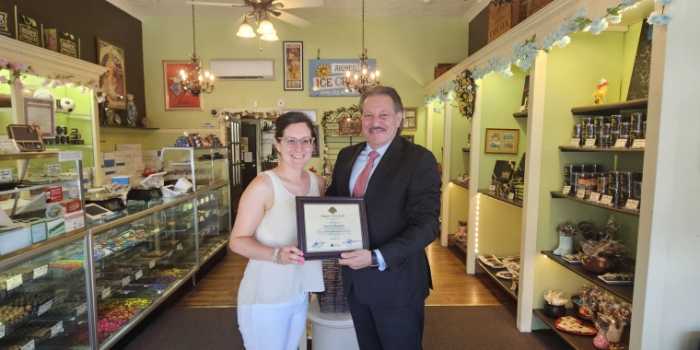By Dustin Brown
Hundreds of immigrants are expected to pile into the narrow hallway on the fourth floor of 74-09 37th Ave. April 20 to fight for a chance to learn English. But only about one in four will get a spot.
Heightened immigration coupled with stagnant funding have put enormous pressure on English courses offered by community-based organizations like the Jackson Heights Community Office of the Forest Hills Community House. Inspired by the possibility of assimilating into American society, potential students begin lining up at 6 a.m. with the hope they won’t be relegated to a waiting list — or shut-out completely.
The odds of getting a spot in an English course may increase substantially if City Council Speaker Peter Vallone (D-Astoria) succeeds in pushing $5 million through the council budget to fund English for Speakers of Other Languages instruction. He announced the allocation April 4 in front of the Jackson Heights Branch of Queens Public Library, as dozens of adult ESOL students eagerly looked on.
Vallone’s allocation represents the first time the Council has provided funding for ESOL programs. If approved in the final budget, most of the money will likely be distributed by the city Department of Youth and Community Services to community-based organizations.
“On their registration days they turn away hundreds of people,” said Amy Taylor, a program associate at the New York Immigration Coalition. “People have been on waiting lists for years. There are severe, severe shortages. It’s literally a lottery to get into a class.”
NYIC estimates that more than a million New Yorkers need ESOL classes. With 50,000 available slots in the city, however, only 5 percent of the need is being met, Taylor said.
“There’s a mythology out there that immigrants do not want to learn English and that’s absolutely false,” said K.C. Williams, director the Jackson Heights office. “They understand that the inability to communicate in the English language is a barrier to reaching their dreams.”
The Jackson Heights office offers citizenship classes and five levels of English language courses in two sessions every day, from 9 a.m. to 11:30 a.m. and from noon to 2:30 p.m. Language students attend 12 hours of class a week for approximately two months, then move up the ladder to higher levels of training as their English improves.
“Basically if a student starts in our day program in September and finishes our program in June, they end up speaking English,” said Williams. “We really change people’s lives.”
When classes are in session the three rooms in Suite 421 are cramped. Eighteen students fill two rows of desks in the shoe-box- shaped room, leaving a sliver of floor space for the teacher to pace along the wall. But the rooms sit empty after 2:30 p.m. because the office simply cannot afford to run any more classes.
Although the council budget is in its early stages and no one knows how exactly the funding would be distributed, Williams is already imagining how a boost in monies could affect her programs.
“We could make such better use of our existing classroom space,” she said. “We could expand exponentially within our own space, and our rent costs wouldn't go up.”
In addition to giving more immigrants a chance to master English, more classes would enable current students to continue with their English studies beyond Level 5, which is currently the most advanced course offered at the center.
“We need more levels,” said Khadiza Khatun, a Level 5 student from Bangladesh. “We are poor people. We don't have money to pay for more English classes.”
Members of many of the classes attended Vallone’s announcement last week at the Jackson Heights branch of the Queens Public Library, and students in Friday’s class got extensive English practice as they discussed the merits of Vallone’s plan.
“We have to worry about these people because they have to get into the community,” said Gloria Rios, an immigrant from Honduras. “They feel … alienated,” she continued once teacher Bruce Armstrong helped her fish for the right word.
“Their English improves a lot when they think something’s at stake,” Armstrong said. “If something really involves them — about their family and community — if they need to say something, they will say it.”
Many of the students are parents who hope English skills will enable them to better help their children — whether it be conferring with teachers or explaining an ailment to the pediatrician.
That’s the hope of Paula Andrea Navarrete, an immigrant from Colombia who spoke slowly but confidently as she gestured to her belly, which was swollen with a baby expected to be born within the week.
She said by learning English, “I can help her do her homework and I can go with her to the doctor . . . and speak to everybody about my experiences.”
Reach reporter Dustin Brown by e-mail at Timesledgr@aol.com or call 229-0300, Ext. 154.


































